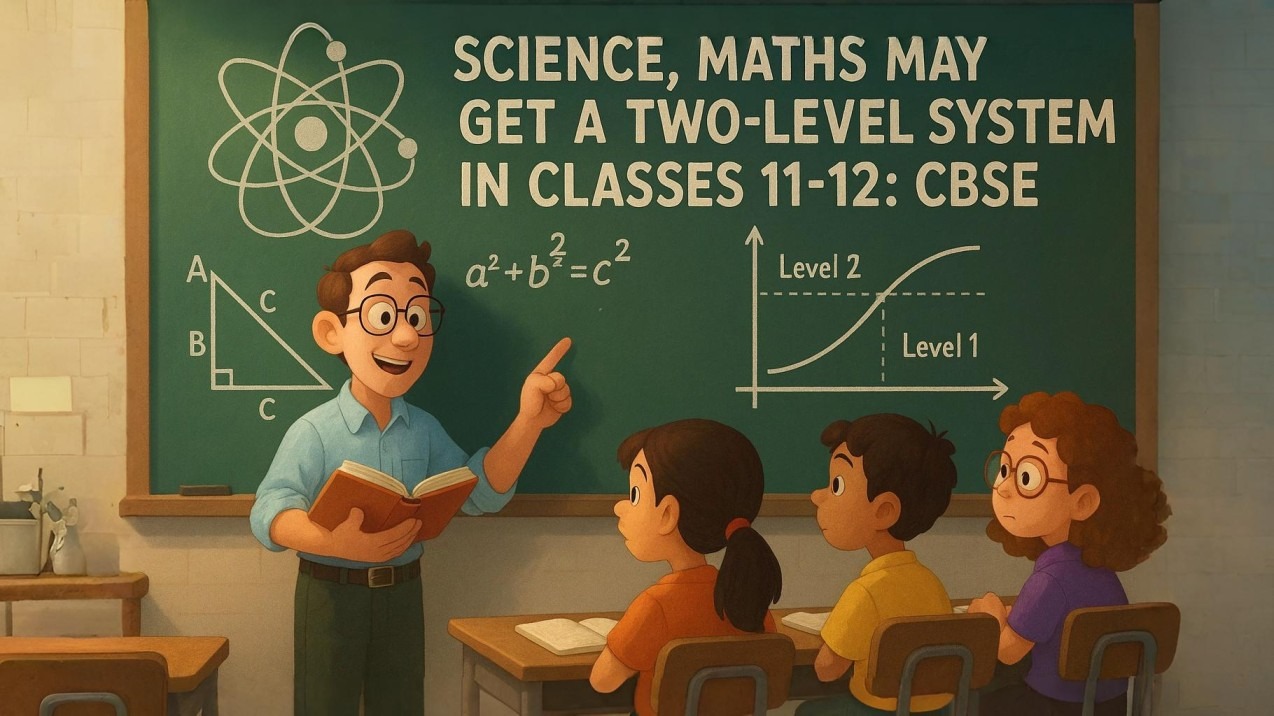Loading advertisement...
22-07-2025

The Central Board of Secondary Education (CBSE) is considering a significant curriculum reform—introducing a two-tier system in Science and Mathematics for students in Classes 11 and 12. This change is expected to address the varying academic needs, interests, and career goals of students across the country.
Currently, all CBSE students study the same level of difficulty in Science and Mathematics in senior secondary classes. However, not all students pursue science-based careers or competitive exams like JEE or NEET. Recognizing this diversity, CBSE aims to:
The new structure is likely to resemble the existing two-level Mathematics system in Class 10 (Standard and Basic).
| Level | Focus | Ideal For |
|---|---|---|
| Basic | Conceptual clarity, simple application | Humanities/Commerce students or non-science careers |
| Advanced | In-depth theory, problem-solving, numerical skills | Students aiming for JEE, NEET, or science streams |
Students would be able to choose their preferred level at the start of Class 11, based on their aptitude and future plans.
Educational experts and school principals have welcomed the idea, saying it could:
Cater to individual learning capacities.
Prevent rote learning.
Encourage personalized learning paths.
However, they also emphasize the need for proper training, updated textbooks, and assessment guidelines to ensure successful implementation.
The proposal is currently under discussion with the National Curriculum Framework (NCF) and other stakeholders. It may be rolled out in phases after thorough planning and piloting.
✅ Reduces pressure on students
✅ Promotes academic flexibility
✅ Supports career-based subject selection
✅ Aligns with NEP 2020’s learner-centric approach
Of course! Here's more detailed content to extend your blog further—focusing on challenges, implementation ideas, comparisons, and student reactions.
The two-level system would also require changes in assessment patterns. Here's what we might expect:
Possibility of level upgradation if students show aptitude later in the academic year.
CBSE may allow students to switch to the Advanced level mid-year with teacher recommendation, though this is still under consideration.
The proposal directly aligns with the National Education Policy (NEP) 2020, which emphasizes:
By offering a choice between Basic and Advanced levels, CBSE supports NEP’s goal to make learning more adaptive, inclusive, and relevant to student goals.
Many global education systems, like the UK’s GCSEs and A-levels, already follow a tiered approach. Here's how CBSE's move compares:
| Country | System Type | Key Feature |
|---|---|---|
| UK | GCSE/A-Level | Basic & advanced study streams |
| USA | Standard/AP courses | Optional advanced courses for credits |
| India (CBSE) | Proposed Basic/Advanced | Career-focused academic flexibility |
This move could help Indian students compete and collaborate more effectively on a global stage.
Reactions to the news have been mixed but mostly positive:
Students who don’t plan to pursue STEM careers are relieved by the idea of a less rigorous option.
Parents appreciate that the new system can reduce academic pressure and promote interest-driven learning.
However, some are concerned about labeling or limited opportunities for Basic-level students in higher education.
CBSE is expected to clarify these concerns before final implementation.
Schools will need proper teacher training, curriculum updates, and resources for both levels.
Students should carefully consider their career interests before choosing a level.
Counseling support may be essential for students to make informed subject-level decisions.
Colleges and universities may need to adjust admission criteria to recognize both levels fairly.
CBSE's move to bring two levels of Science and Maths in senior secondary classes is a bold step toward personalized education. While there are logistical and policy hurdles to cross, this reform could become a milestone in shaping India’s future education system—giving students more control, confidence, and clarity in their learning journey.
✅ Stay connected with Skool Guru for more educational tips, exam strategies, and academic guidance.
📞 Need help? Contact our mentors today!
Visit: www.skoolguru.in